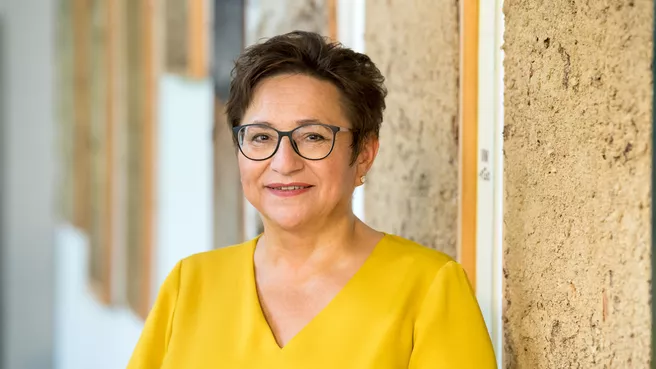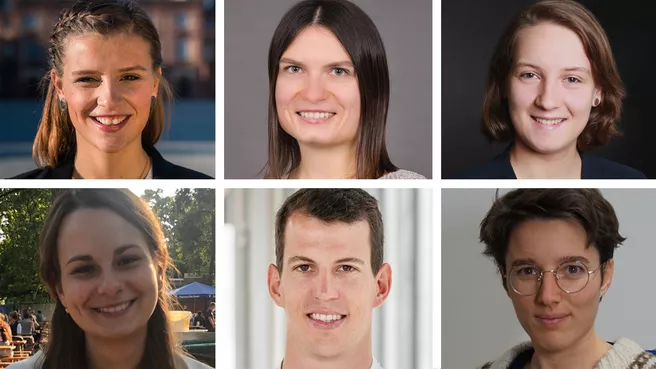"This year - like many others - presented us with great challenges," reports the Dean of the TUM School of Life Sciences, Prof. Ingrid Kögel-Knabner. After having to start the year almost exclusively with online teaching, the school was delighted to welcome students - especially first-year students - on site in the fall at the start of the winter semester. The year was used to flexibly adapt to the changing circumstances and, for example, to update the lecture halls to the latest technical standards in order to be equipped for both face-to-face and online teaching.
Feeling enthusiasm and excitement
"During this time, however, we also felt very clearly once again how important it is that we continue our research, which is, after all, concerned precisely with the question of how we can live in a healthy environment," Kögel-Knabner emphasizes. "I hope that we can all feel this enthusiasm and excitement to solve problems again next year," she says in her video.
New and old faces at Weihenstephan
Retiring in 2021 are Prof. Hans Rudolf Fries (Animal Breeding, appointed in 1995), Prof. Ulrich Kulozik (Food and Bioprocess Engineering, appointed in 2000), Prof. Siegfried Scherer (Microbial Ecology, appointed in 2003) and Prof. Rudi F. Vogel (Technical Microbiology, appointed in 1993).
For the first time, the newly emeritus professors themselves have their say: Prof. Ulrich Kulozik and Prof. Hans Rudolf Fries tell Vice-Dean Prof. Wolfgang Liebl in a video interview about their experiences during their time at Weihenstephan. For example, the discussions in the courses with the young, interested students were among the particularly good memories, but they do not mourn the administrative tasks that are also part of being a professor.
Newly appointed to the TUM School of Life Sciences this year is Prof. Mathias Wilhelm, who has held the professorship of Computational Mass Spectrometry since March 2021. "Mass spectrometers are very accurate scales that allow us to determine the mass and quantity of molecules in complex mixtures," Wilhelm explains. His research focus is on developing informatic methods to help better evaluate, store and provide this data. The aim is to use artificial intelligence to capture the data in greater detail and then make it available in a database in such a way that it can be ideally used for basic research and clinical applications.
Awards for researchers
Once again this year, men and women who are among the most cited in the world and thus enjoy special prestige and prominence in the research community deserve special attention. This year, the so-called "Highly Cited Reaserchers" include twelve scientists from TUM - eight of whom teach and conduct research at the School of Life Sciences in Freising, namely: Prof. Senthold Asseng (Chair of Digital Agriculture), Prof. Bernhard Küster (Chair of Proteomics and Bioanalytics), Prof. Michael Schloter (Honorary Professor of Soil Microbiology), Prof. Rupert Seidl (Ecosystem Dynamics and Forest Management in Mountainous Landscapes), Prof. Fabian Theis (Chair of Mathematical Models of Biological Systems), Prof. Wolfgang Weisser (Chair of Terrestrial Ecology), Prof. Ingrid Kögel-Knabner (Chair of Soil Science), Dr. Takuya Yoshida (Chair of Botany).
Other notable awards this year included the 2021 European Gastroenterology Research Award (UEG) to Dirk Haller, Professor of Nutrition and Immunology, and the Consolidator Grant, a highly endowed grant from the European Research Council (ERC), to Rupert Seidl, Professor of Ecosystem Dynamics and Forest Management in Mountain Landscapes.
Prizes for the best student master's theses
Once again this year, the best master's theses were awarded the prize of the Mayor of the City of Freising. "The year 2021 has shown how important science is for society and so we as the city of Freising are happy and proud to have a university in our city that always has its finger on the pulse and is known for excellent research and teaching far beyond the county borders," said Lord Mayor Eschenbacher via video address.
As a university town, it was therefore a special concern to award the best final theses of the students in the six fields of study again this year. He congratulated the students on their outstanding work and emphasized that the selection was particularly difficult for the jury this year, given the large number of good nominations.
One master's thesis per field of study was awarded, and the winners each received prize money of 250 euros. The winners in the 2020/2021 academic year are Carolin Betz (Agricultural and Horticultural Sciences), Clara Igisch (Biosciences), Lukas Viebahn (Brewing and Food Technology), Ana Ivić (Nutritional Science and Food Chemistry), Leonie Wagner (Forestry and Resource Management) and Tiia Haberstok (Landscape Architecture and Landscape Planning).
Editing:
Susanne Neumann
TUM School of Life Sciences
Press and Public Relations

